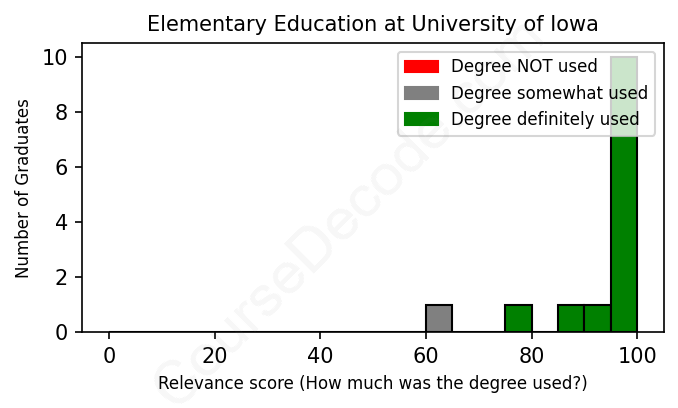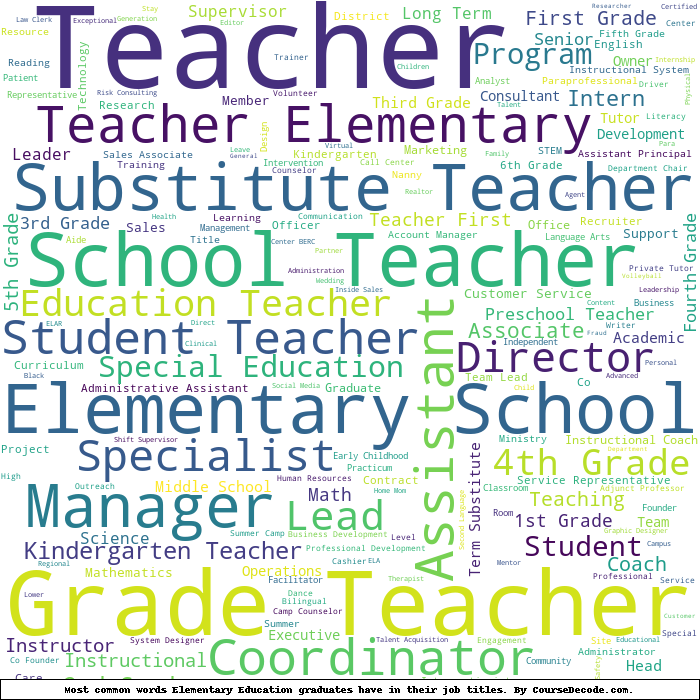
First, some facts. Of the Elementary Education graduates from University of Iowa we've analyzed , here's how many have used (or NOT used) their degree in their career:

These are estimates based on AI analysis of 14 LinkedIn profiles (see below).
The verdict? Great! Overall, with an average relevance score of 93%, Elementary Education graduates from University of Iowa have a substantially higher likelihood (+26%) of finding work in this field compared to the average graduate across all fields:
And for comparison, here's the chart for all profiles we've looked at across all degrees.
Also, after graduating, 50% of these graduates have pursued further education other than another Bachelor's degree (such as a Masters degree or other), compared to the average across all profiles of 35%. This suggests you may need more than just a Bachelors degree to be competitive as a Elementary Education graduate.
See the details:
|
Relevance score: 100% We think this person has gone into a career highly relevant to their degree. We think this person has gone into a career highly relevant to their degree.
DEGREE INFOGraduated in 2014 from University of Iowa with a Bachelor's Degree in Elementary Education. No other secondary education since. JOB HISTORY SINCE GRADUATION2nd Grade Teacher Diamond Canyon Elementary Aug 2015 - Present ABOUTNo information provided. |
The top 10 most common jobs done by the graduates we've analyzed (ranked most common to least) are:
After looking through the LinkedIn profiles of University of Iowa graduates in Elementary Education, it’s pretty clear that a significant number of these graduates have taken on roles directly related to teaching in elementary schools. Positions like 1st Grade Teacher, 2nd Grade Teacher, and even specialized roles such as an English Language Learner Teacher show a strong alignment with their educational background. Many have gone on to work as classroom teachers in various grades, thereby fully utilizing the skills and knowledge they've gained during their studies. This makes sense, right? Since they studied Elementary Education, you'd expect them to teach, and that's exactly what most of them are doing.
However, there are some positions that don’t fully align with what you would typically consider relevant to Elementary Education. For example, roles like Technology Assistant, Personal Assistant, or even being a Training Specialist are examples where the connection is a bit weaker. While some skills from their degree might be useful, these jobs don't directly involve teaching or working with elementary-aged kids on a regular basis. But overall, it looks like the majority of these graduates have found their way into teaching roles that closely match their degrees, making a positive impact in classrooms across multiple districts.
Here is a visual representation of the most common words in job titles for Elementary Education graduates (this is across all Elementary Education graduates we've analyzed, not just those who went to University of Iowa):

The career trajectories of graduates from the University of Iowa's Elementary Education program reveal quite a few common paths, especially during the early years after graduation. Most of these alumni start their careers as teachers, primarily in elementary school settings. For instance, many landed jobs as 1st, 2nd, or 3rd-grade teachers right after graduation, which is a pretty typical first step for someone in this field. You can see a clear trend where graduates get their foot in the door with teaching roles or related positions, like paraprofessionals or long-term substitutes, almost immediately after obtaining their degrees.
As time passes—say about five to ten years later—the picture remains mostly positive. Many of these educators transition into more specialized or advanced roles, such as instructional coaches or intervention specialists. It seems that a good chunk of these graduates sticks to careers related to education, showcasing a commitment to teaching and helping young learners. However, a few individuals do explore other paths or shift into roles outside traditional classroom settings, like working in administrative or training capacities. Overall, it looks like the majority have found fulfilling careers that align well with their degrees, which is definitely a great outcome for anyone considering this field.
A Bachelor’s degree in Elementary Education, including at places like the University of Iowa, is generally seen as challenging but doable, especially if you’ve got a passion for teaching kids. You'll have to navigate through a mix of coursework that covers everything from child development and teaching methods to classroom management, and you’ll also dive into some hands-on experiences with real students through practicum placements. There are definitely some tough moments, like those intense lesson planning assignments and the pressure of student teaching, but if you're organized and genuinely interested in the subject, it's pretty manageable. Overall, it might not be as overwhelmingly tough as some other degrees, but it definitely requires dedication and a love for learning!
Most commonly, in the LinkedIn profiles we've looked at, it takes people 4 years to finish a Bachelor degree in Elementary Education.
Looking at these grads from the University of Iowa, it seems like many of them have stuck with teaching, which is pretty cool but not always the best for making big bucks. Most of them have steady jobs as elementary school teachers, which is rewarding but typically offers mid-range salaries, especially starting out. A few have moved into coaching and leadership roles, like instructional coaches, which could lead to higher pay over time, but overall, you can expect that their earnings might not be high compared to other careers. So, while they likely aren't raking in the big bucks, they're probably earning a decent living, especially considering the value of the work they do with kids!
Here is a visual representation of the most common words seen in the "about" section of LinkedIn profiles who have a Bachelor degree in Elementary Education (this is across all Elementary Education graduates we've analyzed, not just those who went to University of Iowa). This may or may not be useful:

Here are all colleges offering a Bachelor degree in Elementary Education (ordered by the average relevance score of their Elementary Education graduates, best to worst) where we have analyzed at least 10 of their graduates: